Ukrainian lessons
Do not stop reading, it will not be about politics. Language as it is. Brief notes for a quick start of understanding Ukrainian, well, and at the end a bit of programming, so that it’s not quite offtopic.
Several remarkable features of the Ukrainian language.
1. The vocative case.
')
This category, dear to the heart, was in general the progenitor of all Slavic languages, but now it remains rudimentary. Although it is understandable to the bearer of contemporary Russian, take the appeal “Friendly!”. The vocative case is familiar to us from the Bible (“Our Father!”, “To the Doctor, Heal Yourself!”), Which is not surprising, since Church Slavonic is a Solun dialect of Old Bulgarian.
Examples:
- Galyu, come!
- Volodymyr Volodymyrovich!
- Irina Stepanivno!
In modern Russian, the plural of the genitive case is often used as a vocative: “Mish, and Mish! “Sorry, Nast, I'm busy.” However, it is not possible to refer to more than one individual in this way, and in Ukrainian it is possible (see point 4).
UPD. - Some linguists believe that this is the seventh Russian case.
2. Education future tense without auxiliary words.
The science of linguistics teaches us that the languages at the dawn of their origin used only the present tense of verbs (“what I see, I sing about”). Even now, the present time is sometimes used to convey the past in the narrative of events: “I run out into the street, he rushes at me ...”, and it is so accepted not only in Russian.
Then, when it was necessary to form the past and the future, they began to use one of the most common verbs - “to be”, “to go”, “to have”, “to do” as auxiliary words in many languages (in any case, Indo-European). The latter in this capacity lost their basic meaning and became official, therefore in English constructions like I had had and How do you do became possible. According to this model, times are formed in French, I will not say about others.
What is interesting is that in the Russian and Ukrainian education of the future went in different ways. In Russian - through the verb "to be": "Stop, I will shoot!". And in Ukrainian - through the verb to have, "mother" in Ukrainian. An interesting metamorphosis happened next to the latter - it turned into a suffix:
“I have to go, I will go” - “I-Maya” - “Itima” (compare with English I have to go!)
Accordingly - beating (I will beat, I will beat), streame (here you understood everything and stopped), robitim (I will do, work) and so on.
3. "Dog" in Ukrainian will be ... a dog. Only masculine
“Priishov is a great dog” - “A big dog has arrived”
4. The union "OR" and the particle "LI" sound the same in Ukrainian - "CHI".
But if the use of “CHI” as a union is no different from Russian, then with a particle everything is much more interesting - it is put in front of the whole sentence.
“Chi є bazhannya popity kawi, Panov?” - Do you want to drink coffee, comrades?
"Panov" - the same vocative case, the plural, see paragraph 1
UPD. There is another option OR - ABO
5. Dative case.
The suffix dative case in Ukrainian is much more spreading than in Russian.
“Taras Shevchenko was 13 years old” - Taras Shevchenko was then 13 years old (yes, the male surnames of the middle kind in Ukrainian also lean)
“Give me your fuckin old!” - Say hello to the old hell. (Sergey Zhadan, “Big Mac”).
“Vіtannya” - hello, greeting, there is also a single “root”, which shows a common root with Russian, although it means “congratulations”.
Done with the grammar (well, in general), it's time to do phonetics and spelling.
6. My great-aunt, who left the USSR in 1925 for three years to France, said, laughing, that she wrote letters in “phonetic Russian”. This cada of both slyshitstsa and pishetstsa. On the one hand, all phonetic alphabets were created in order to transmit the pronunciation as accurately as possible. Unlike syllabic (syllabic) and other writing systems (by the way, do you know that all the alphabets used in the world today originated from Phoenician? Except for only Japanese, and they appeared as a simplified alternative to the hieroglyphic writing). On the other hand, the language is changing all the time and much faster than spelling reforms, which are difficult and extremely costly, are undertaken. So recently Kazakhstan refused to switch to Latin (and then it seemed to agree again?). As a result, we have a wide range of alphabets that, according to the accuracy of phonetics, are close to or far from the principle of "how to hear ..."
At one extreme, and this is not my opinion, but Dmitry Petrov, a well-known polyglot and synchronizer (he, by the way, advised the Kazakh authorities on the transition to the Latin alphabet), is French. If in the pronunciation and spelling of the word “MERCY” the number of sounds and letters equals (MERCI), then already “BOKU” has letters twice as many as BEAUCOUP. Thank you very much for this way of writing words!
At the other extreme is probably Belarusian:
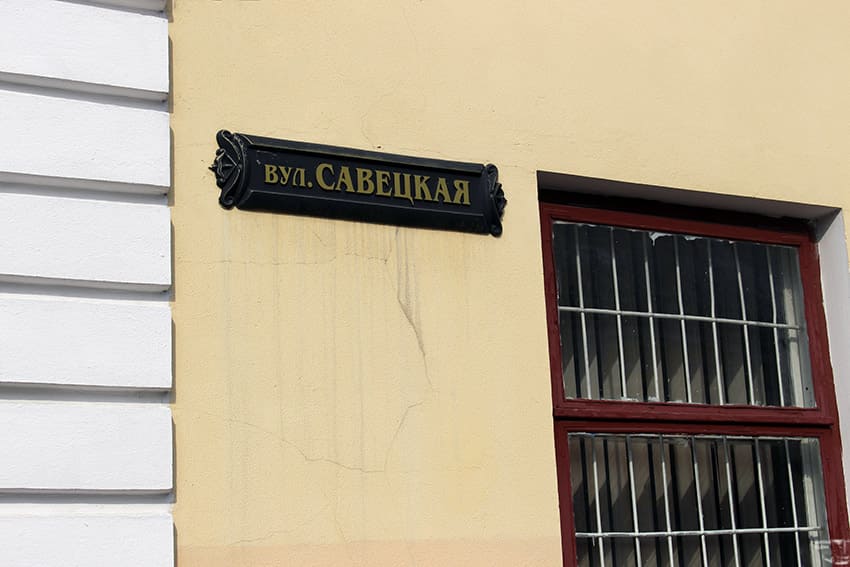
Ukrainian (this is my personal opinion) occupies an intermediate position between Russian and Belarusian - the rules of writing in it are simpler than in Russian, but not as literal as in the third East Slavic language:
7. Alphabet. Ukrainian alphabet has a couple of additional letters
"І" - reads like a Russian "And"
"Ї" - reads like the Russian "YI", is used not often, but is present in the name of the capital - Kyiv, the mother of Russian cities
and the three letters of the Cyrillic alphabet are not used at all - , and . Instead of , a combination of is put, instead of a solid sign - an apostrophe ("HALF" - flame), as in pre-revolutionary Russian, and the free letter thanks to the Latin І as y.
Accordingly, "E" is read as "E", and the inverted "Є" - as "E".
8. One of the very nice features of Ukrainian is the doubling of consonant sounds, almost always with a second soft sound.
- VESILLYA (wedding)
- BAGATTYA (fire)
- POSSIBLE (face)
- APPLICATION (ACCESSORIES)
- VOID (weapon)
Everything reads like a soft sign between double consonants.
In Russian, doubling is almost always found at the root or on the border of the prefix with the root (rejection, poddevyka, pollitrovka), and not with all the letters (double H seems not to be found at all?), And sounds solid.
9. Finally, check harmony with algebra.
Everyone recognizes that Ukrainian is a smooth, melodious, flowing language, very beautiful to the ear. In order not to assert this unfoundedly, we’ll either slide into conversations, who is the progenitor, and who is better, did a little analysis on 2 translations of the same work by Stanislav Lem.
A wonderful science fiction and great thinker Stanislav Lem wrote at the end of his life with bitterness that he was little known to the English-speaking world. In the world pantheon of philosophers and writers, he clearly occupies an unsuitably modest place. But we, the speakers of close Eastern Slavic languages, should be grateful for his Polish character, since the magnificent play on words, which is full of his works, is elegantly translated into Russian and Ukrainian. Moreover, Ukrainian is even better.
The work - “Powrót z gwiazd”.
In Polish it sounds rude to our hearing (West Slavic languages, incompleteness).
In Russian it is already better - “Return from the Stars”.
In Ukrainian - just a song: "The Turn of the Heart"
Let's develop mathematically precise criteria for the beauty and smoothness of speech (there is a smiley here). The first thing that comes to mind is the ratio of vowels and consonants. A very smooth speech (what is the closest Russian analogue of the English fluent?), Apparently, arranged so that the consonants alternate (alternate) with vowels and can be cast without hesitation, as in a folk song:
Samasadikyasadilasamabudupolivat
Samililogubilasamabuduzabyvat
That is, criterion number 1 - the ratio of vowels and consonants and the number of consonants in a row on which the flow of speech stumbles. The same applies to word boundaries.
Further, it will be interesting to analyze the ratio of voiced and deaf sounds (this is their own characteristic, some go in pairs, some - by themselves
B - P
B - F
G - X
D - T
F - W
H - C
and besides, there are voiced without a pair of LNR, and deaf people without a pair of CCCH).
And also we will take an interest in the relative amount of soft and hard sounds - this is determined by the vowel following, all vowels are in pairs, one sound of which softens the previous consonant, the other - no
AND I
E - E
AND - S
O - yo
U - U
The ratio of vowels and consonants - Ukrainian outweighs very little in favor of vowels

The number of voiced and deaf consonants - voiced more in Russian
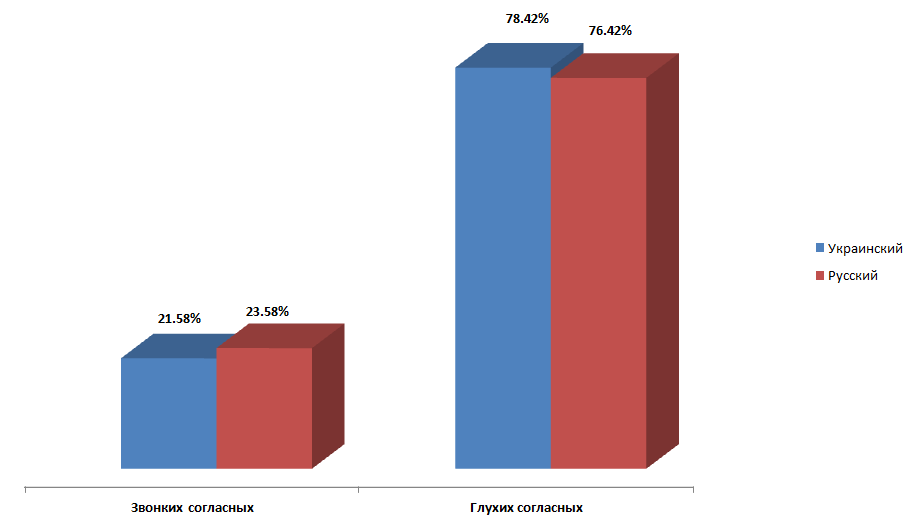
The number of hard and soft consonants - and more soft in Russian
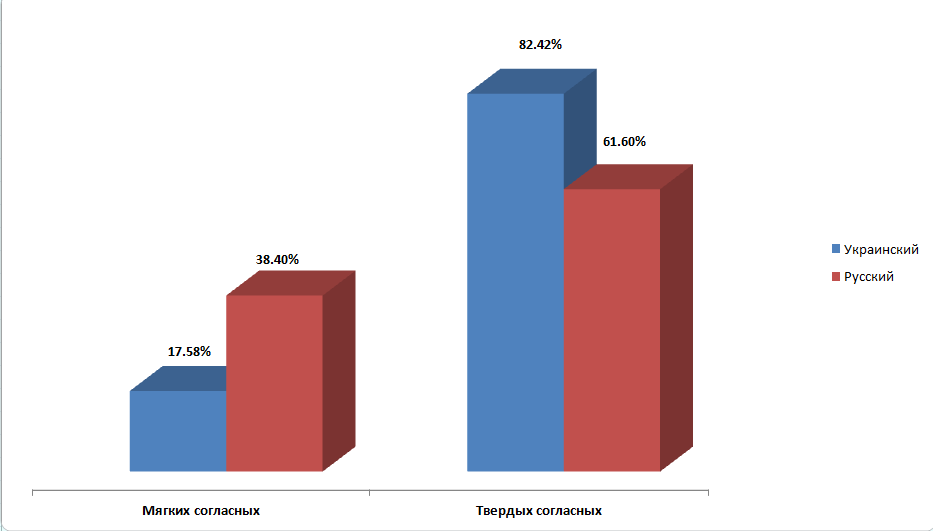
The number of consonants in a row - here the Ukrainian is noticeably inferior to the Russian, and, apparently, this determines the beauty of speech!
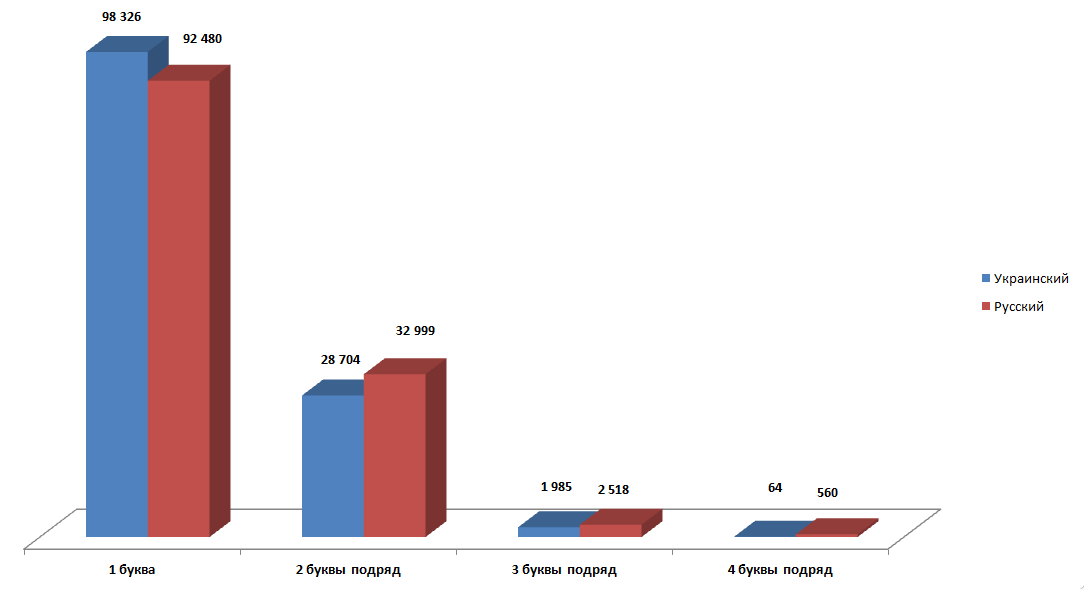
On the boundaries of words, two consonants are also found more often in Russian.
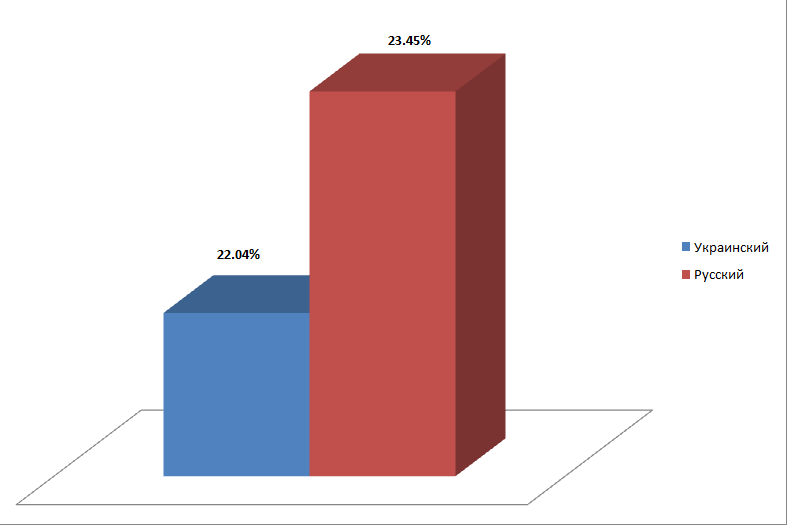
1) WORDS - MEMORIZED FRIENDS OF THE TRANSLATOR (similar to English MAGAZINE):
FRIENDS - WIFE (from the word FRIEND, by the way! We only have HOSTER formed on the same principle)))
CHOLOVIK - HUSBAND (and the person will be an PEOPLE, as the only thing from PEOPLE, it is logical)
NEDILA - SUNDAY (WEEK WILL BE THIS)
HISTORY - SURNAME (nothing offensive. Actually "nickname" - PRIZIZKO)
BROKUVATI - not enough, not reach.
VESELKA - a rainbow (is it boring?)
HOUR - TIME (and Russian HOUR will be GODINA - and not necessarily dashing)
2) Words directly borrowed from other languages and most likely familiar
PARASOL - umbrella (Spanish PARASOL - "against the sun")
KRAVATKA - TIE (French CRAVATE)
DAH - ROOF (German DACH)
RESHTA - ALL OTHER (THE REST)
MUR - WALL (MUR French. Interestingly, Russian "immured (demons)" - from the same place?)
MAPA MAP (MAP!)
SENS - MEANING (SENS English)
COMA - Comma (COMMA English) (author's school nickname, by the way)
In Western Ukraine, cologne (eau de Cologne) says “Kolonska Voda”, but this is not an all-Ukrainian norm. By the way, YAR in the same territories - SPRING. Remember, what else is wheat, except for winter?
3) Old Slavonic words
POSADA - Position (remember Sergiev, Pavlovsky, etc.)
MITO - customs duty, the word of the same root as the "tax collector". The ordeal, which only remains of this root in modern Russian, therefore, means problems with tax))
4) The names of the months, all - natural, so to speak, origin (in Russian everything is Latinized, and it also carries the imprint of the pre-Christian calendar, from September to December!)
1 Sichen
2 luti
3 Birch
4th Quarter
5 Traven
6 Cherven
7 Lipin
8 Serpen
9 Veresen
10 of Zhovten
11 Leaf Fall
12 Breasts
EXAMPLE. From taxes, as we are strongly inspired here and almost already inspired, can not escape, so we analyze the Ukrainian version of VAT
PDV - SUPPLY TO DODAN VARTIST
According to:
SUPPLY - this is Old Slavic Filed (paragraph 3 above)
DODAN - “I have a business lunch, you didn't give me the compote!” - everything is clear, isn't it?
This, by the way, is far from the only example of the fact that many things that sound Russian colloquially, or are deliberately wrong, in fact, are normative in Ukrainian, and the speakers of Russian, apparently, subconsciously feel it. This includes, for example, the use of the middle gender in the phrases “it does not work / does not turn on / does not open” regardless of the nature of what does not work, etc. in fact.
"I went to the sheaf, shkandibibala, Іvana sina year
Vono shout є screamed ... "(Taras Shevchenko)
She dragged herself into sheaves to feed her son Ivan, and then immediately, the middle race.
“Trust” - swaddled, remember, by the way, the word “midwife”.
UPD. Friends pointed out - this is not the neuter gender, but the fourth in Ukrainian. “Nemovlya”, “Koshenya”, “Dog”
Will you comment?
And finally, VARTIS - cost, value. This is in the section of direct borrowing, as in paragraph 2), one root with a German wert or English worth.
Thanks for reading!
Several remarkable features of the Ukrainian language.
1. The vocative case.
')
This category, dear to the heart, was in general the progenitor of all Slavic languages, but now it remains rudimentary. Although it is understandable to the bearer of contemporary Russian, take the appeal “Friendly!”. The vocative case is familiar to us from the Bible (“Our Father!”, “To the Doctor, Heal Yourself!”), Which is not surprising, since Church Slavonic is a Solun dialect of Old Bulgarian.
Examples:
- Galyu, come!
- Volodymyr Volodymyrovich!
- Irina Stepanivno!
In modern Russian, the plural of the genitive case is often used as a vocative: “Mish, and Mish! “Sorry, Nast, I'm busy.” However, it is not possible to refer to more than one individual in this way, and in Ukrainian it is possible (see point 4).
UPD. - Some linguists believe that this is the seventh Russian case.
2. Education future tense without auxiliary words.
The science of linguistics teaches us that the languages at the dawn of their origin used only the present tense of verbs (“what I see, I sing about”). Even now, the present time is sometimes used to convey the past in the narrative of events: “I run out into the street, he rushes at me ...”, and it is so accepted not only in Russian.
Then, when it was necessary to form the past and the future, they began to use one of the most common verbs - “to be”, “to go”, “to have”, “to do” as auxiliary words in many languages (in any case, Indo-European). The latter in this capacity lost their basic meaning and became official, therefore in English constructions like I had had and How do you do became possible. According to this model, times are formed in French, I will not say about others.
What is interesting is that in the Russian and Ukrainian education of the future went in different ways. In Russian - through the verb "to be": "Stop, I will shoot!". And in Ukrainian - through the verb to have, "mother" in Ukrainian. An interesting metamorphosis happened next to the latter - it turned into a suffix:
“I have to go, I will go” - “I-Maya” - “Itima” (compare with English I have to go!)
Accordingly - beating (I will beat, I will beat), streame (here you understood everything and stopped), robitim (I will do, work) and so on.
3. "Dog" in Ukrainian will be ... a dog. Only masculine
“Priishov is a great dog” - “A big dog has arrived”
4. The union "OR" and the particle "LI" sound the same in Ukrainian - "CHI".
But if the use of “CHI” as a union is no different from Russian, then with a particle everything is much more interesting - it is put in front of the whole sentence.
“Chi є bazhannya popity kawi, Panov?” - Do you want to drink coffee, comrades?
"Panov" - the same vocative case, the plural, see paragraph 1
UPD. There is another option OR - ABO
5. Dative case.
The suffix dative case in Ukrainian is much more spreading than in Russian.
“Taras Shevchenko was 13 years old” - Taras Shevchenko was then 13 years old (yes, the male surnames of the middle kind in Ukrainian also lean)
“Give me your fuckin old!” - Say hello to the old hell. (Sergey Zhadan, “Big Mac”).
“Vіtannya” - hello, greeting, there is also a single “root”, which shows a common root with Russian, although it means “congratulations”.
Done with the grammar (well, in general), it's time to do phonetics and spelling.
6. My great-aunt, who left the USSR in 1925 for three years to France, said, laughing, that she wrote letters in “phonetic Russian”. This cada of both slyshitstsa and pishetstsa. On the one hand, all phonetic alphabets were created in order to transmit the pronunciation as accurately as possible. Unlike syllabic (syllabic) and other writing systems (by the way, do you know that all the alphabets used in the world today originated from Phoenician? Except for only Japanese, and they appeared as a simplified alternative to the hieroglyphic writing). On the other hand, the language is changing all the time and much faster than spelling reforms, which are difficult and extremely costly, are undertaken. So recently Kazakhstan refused to switch to Latin (and then it seemed to agree again?). As a result, we have a wide range of alphabets that, according to the accuracy of phonetics, are close to or far from the principle of "how to hear ..."
At one extreme, and this is not my opinion, but Dmitry Petrov, a well-known polyglot and synchronizer (he, by the way, advised the Kazakh authorities on the transition to the Latin alphabet), is French. If in the pronunciation and spelling of the word “MERCY” the number of sounds and letters equals (MERCI), then already “BOKU” has letters twice as many as BEAUCOUP. Thank you very much for this way of writing words!
At the other extreme is probably Belarusian:

Ukrainian (this is my personal opinion) occupies an intermediate position between Russian and Belarusian - the rules of writing in it are simpler than in Russian, but not as literal as in the third East Slavic language:
- There is no doubling of consonants in borrowed words, so as not to fool the head of the teachings (students, that is) - to write correctly “commune, collective” and so on, even though these words are not trendy now,
- The rule on "THOSE" allows only one option - always with a soft sign!
- In the Ukrainian, the prefix WITHOUT before the deaf consonant is not stunned (that is, it does not turn into WES), compare INSIDE (directly) - IMPARTIAL. Before the revolution and the last spelling reform, by the way, they wrote in Russian.
7. Alphabet. Ukrainian alphabet has a couple of additional letters
"І" - reads like a Russian "And"
"Ї" - reads like the Russian "YI", is used not often, but is present in the name of the capital - Kyiv, the mother of Russian cities
and the three letters of the Cyrillic alphabet are not used at all - , and . Instead of , a combination of is put, instead of a solid sign - an apostrophe ("HALF" - flame), as in pre-revolutionary Russian, and the free letter thanks to the Latin І as y.
Accordingly, "E" is read as "E", and the inverted "Є" - as "E".
8. One of the very nice features of Ukrainian is the doubling of consonant sounds, almost always with a second soft sound.
- VESILLYA (wedding)
- BAGATTYA (fire)
- POSSIBLE (face)
- APPLICATION (ACCESSORIES)
- VOID (weapon)
Everything reads like a soft sign between double consonants.
In Russian, doubling is almost always found at the root or on the border of the prefix with the root (rejection, poddevyka, pollitrovka), and not with all the letters (double H seems not to be found at all?), And sounds solid.
9. Finally, check harmony with algebra.
Everyone recognizes that Ukrainian is a smooth, melodious, flowing language, very beautiful to the ear. In order not to assert this unfoundedly, we’ll either slide into conversations, who is the progenitor, and who is better, did a little analysis on 2 translations of the same work by Stanislav Lem.
A wonderful science fiction and great thinker Stanislav Lem wrote at the end of his life with bitterness that he was little known to the English-speaking world. In the world pantheon of philosophers and writers, he clearly occupies an unsuitably modest place. But we, the speakers of close Eastern Slavic languages, should be grateful for his Polish character, since the magnificent play on words, which is full of his works, is elegantly translated into Russian and Ukrainian. Moreover, Ukrainian is even better.
The work - “Powrót z gwiazd”.
In Polish it sounds rude to our hearing (West Slavic languages, incompleteness).
In Russian it is already better - “Return from the Stars”.
In Ukrainian - just a song: "The Turn of the Heart"
Let's develop mathematically precise criteria for the beauty and smoothness of speech (there is a smiley here). The first thing that comes to mind is the ratio of vowels and consonants. A very smooth speech (what is the closest Russian analogue of the English fluent?), Apparently, arranged so that the consonants alternate (alternate) with vowels and can be cast without hesitation, as in a folk song:
Samasadikyasadilasamabudupolivat
Samililogubilasamabuduzabyvat
That is, criterion number 1 - the ratio of vowels and consonants and the number of consonants in a row on which the flow of speech stumbles. The same applies to word boundaries.
Further, it will be interesting to analyze the ratio of voiced and deaf sounds (this is their own characteristic, some go in pairs, some - by themselves
B - P
B - F
G - X
D - T
F - W
H - C
and besides, there are voiced without a pair of LNR, and deaf people without a pair of CCCH).
And also we will take an interest in the relative amount of soft and hard sounds - this is determined by the vowel following, all vowels are in pairs, one sound of which softens the previous consonant, the other - no
AND I
E - E
AND - S
O - yo
U - U
results
The ratio of vowels and consonants - Ukrainian outweighs very little in favor of vowels

The number of voiced and deaf consonants - voiced more in Russian

The number of hard and soft consonants - and more soft in Russian

The number of consonants in a row - here the Ukrainian is noticeably inferior to the Russian, and, apparently, this determines the beauty of speech!

On the boundaries of words, two consonants are also found more often in Russian.

Application - a small dictionary
1) WORDS - MEMORIZED FRIENDS OF THE TRANSLATOR (similar to English MAGAZINE):
FRIENDS - WIFE (from the word FRIEND, by the way! We only have HOSTER formed on the same principle)))
CHOLOVIK - HUSBAND (and the person will be an PEOPLE, as the only thing from PEOPLE, it is logical)
NEDILA - SUNDAY (WEEK WILL BE THIS)
HISTORY - SURNAME (nothing offensive. Actually "nickname" - PRIZIZKO)
BROKUVATI - not enough, not reach.
VESELKA - a rainbow (is it boring?)
HOUR - TIME (and Russian HOUR will be GODINA - and not necessarily dashing)
2) Words directly borrowed from other languages and most likely familiar
PARASOL - umbrella (Spanish PARASOL - "against the sun")
KRAVATKA - TIE (French CRAVATE)
DAH - ROOF (German DACH)
RESHTA - ALL OTHER (THE REST)
MUR - WALL (MUR French. Interestingly, Russian "immured (demons)" - from the same place?)
MAPA MAP (MAP!)
SENS - MEANING (SENS English)
COMA - Comma (COMMA English) (author's school nickname, by the way)
In Western Ukraine, cologne (eau de Cologne) says “Kolonska Voda”, but this is not an all-Ukrainian norm. By the way, YAR in the same territories - SPRING. Remember, what else is wheat, except for winter?
3) Old Slavonic words
POSADA - Position (remember Sergiev, Pavlovsky, etc.)
MITO - customs duty, the word of the same root as the "tax collector". The ordeal, which only remains of this root in modern Russian, therefore, means problems with tax))
4) The names of the months, all - natural, so to speak, origin (in Russian everything is Latinized, and it also carries the imprint of the pre-Christian calendar, from September to December!)
1 Sichen
2 luti
3 Birch
4th Quarter
5 Traven
6 Cherven
7 Lipin
8 Serpen
9 Veresen
10 of Zhovten
11 Leaf Fall
12 Breasts
EXAMPLE. From taxes, as we are strongly inspired here and almost already inspired, can not escape, so we analyze the Ukrainian version of VAT
PDV - SUPPLY TO DODAN VARTIST
According to:
SUPPLY - this is Old Slavic Filed (paragraph 3 above)
DODAN - “I have a business lunch, you didn't give me the compote!” - everything is clear, isn't it?
This, by the way, is far from the only example of the fact that many things that sound Russian colloquially, or are deliberately wrong, in fact, are normative in Ukrainian, and the speakers of Russian, apparently, subconsciously feel it. This includes, for example, the use of the middle gender in the phrases “it does not work / does not turn on / does not open” regardless of the nature of what does not work, etc. in fact.
"I went to the sheaf, shkandibibala, Іvana sina year
Vono shout є screamed ... "(Taras Shevchenko)
She dragged herself into sheaves to feed her son Ivan, and then immediately, the middle race.
“Trust” - swaddled, remember, by the way, the word “midwife”.
UPD. Friends pointed out - this is not the neuter gender, but the fourth in Ukrainian. “Nemovlya”, “Koshenya”, “Dog”
Will you comment?
And finally, VARTIS - cost, value. This is in the section of direct borrowing, as in paragraph 2), one root with a German wert or English worth.
Thanks for reading!
Source: https://habr.com/ru/post/448634/
All Articles